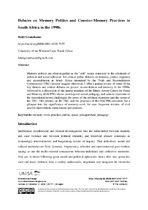Debates on memory politics and counter-memory practices in South Africa in the 1990s
Abstract
Memory politics are often regarded as the “soft” issues contested in the aftermath of political and social upheaval. Yet critical public debates on memory, justice, impunity and reconciliation in South Africa prompted by the Truth and Reconciliation Commission (TRC) process suggest otherwise. I offer a partial review of some of the key themes and critical debates on justice, reconciliation and memory in the 1990s, followed by a discussion of the spatial practices of the Direct Action Centre for Peace and Memory (DACPM) whose multilayered social pedagogy and activist repertoire of the transitional period challenged the terms of the political transition and the scope of the TRC. The debates on the TRC and the practices of the DACPM constitute but a glimpse into the significance of memory-work for now forgotten terrains of civil activist intervention, contestation and practice.

